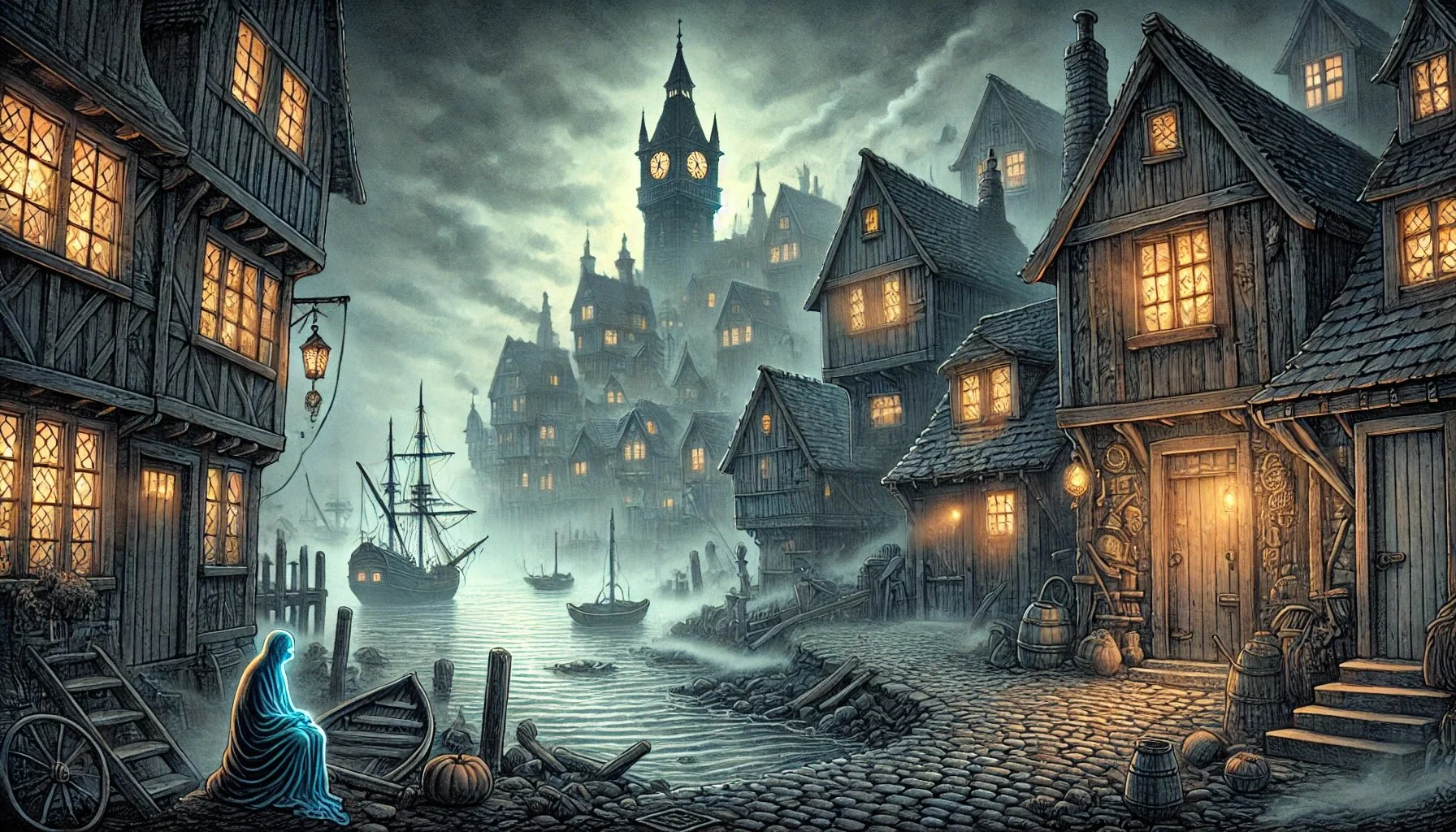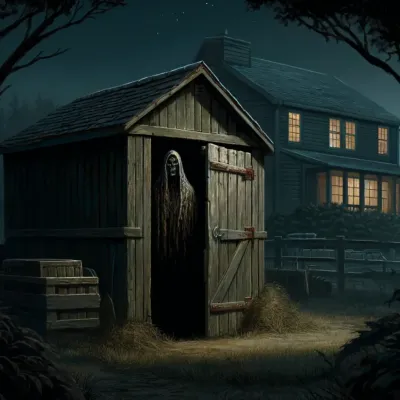
Chronicles of the Veil - The Howling Fog
Arrival in Greystone
It began, as these things often do, on an ordinary day with a hint of the extraordinary. My name is Alaric Vane, and I am, by profession and inclination, an acquirer of the unknown. I am hired by private collectors and eccentric institutions to seek out rare and obscure artifacts, often with peculiar histories. If they happen to be cursed or rumored to carry some malevolent force? Well, that’s where my expertise becomes invaluable.
Of course, that is only part of the story. My work as a consultant is born out of necessity, a lifeline after a rather spectacular fall from grace. Once, I was an esteemed academic—a historian with an eye for lost treasures. That is, until an unfortunate entanglement with a cursed relic left my reputation in ruins and someone I cared about paying a price I could never repay. I turned to this shadowy profession out of both desperation and, perhaps, penance.
But there is one more truth, one I rarely admit even to myself: the Vane family is cursed. For generations, we have been marked by an ancestor’s ill-fated bargain with forces better left undisturbed. I do not fully understand the curse, but I have felt its pull my entire life. It draws me toward the unnatural, the inexplicable, and the dangerous. And so, when I received a letter inviting me to appraise a peculiar pendant in the coastal town of Greystone, I was hardly surprised.
Greystone was the kind of town that appeared to have been forgotten by time. The cobbled streets glistened with perpetual dampness, and the houses leaned into one another as if conspiring against the ever-present mist. The fog itself was not merely an atmospheric condition but a presence, palpable and alive. It swirled with an almost deliberate intent, veiling and revealing in equal measure. The air carried a briny tang, but there was also something else, a whisper of rot beneath the salt.
As my carriage creaked to a stop at the town square, I noted the peculiar stillness. A clock tower loomed above, its face obscured by grime, and yet it did not chime. A fisherman passed by, his shoulders hunched, a net slung over his back. He paused just long enough to glance at me, his eyes shadowed with unspoken warnings, before disappearing into the mist. Tattered charms—shells strung on fraying cords—hung from doorways and windowsills, their purpose unknown but clearly revered.
I arrived on the afternoon tide, greeted by the unsettling silence that seemed to permeate every corner of the town. Even the harbor, lined with sagging boats and weathered ropes, seemed eerily still. A single gull cried out overhead, its voice sharp and lonely against the muffling fog. A faint ringing bell, far out at sea, echoed faintly, though I could see no vessel that might have caused it.
The Innkeeper's Tale
The locals were a dour lot. They moved briskly and avoided eye contact, their faces pale and drawn. It was as though the fog had drained the color from their lives as effectively as it did from the landscape. Even the inn where I stayed seemed reluctant to welcome me, its sign creaking in the still air, the letters barely legible through years of neglect.
The innkeeper was a thin, balding man with eyes that darted to the windows as if expecting something to emerge from the mist. “Y-you’re here for the pendant, Mr. Vane?” he asked, his voice barely above a whisper. He wrung his hands, his knuckles white against the weathered wood of the counter.
“Indeed,” I replied, setting down my leather satchel with a satisfying thud. “And I trust it is as curious as the stories claim?”
He leaned closer, the faint scent of damp wool clinging to him. “It’s cursed,” he said, his voice trembling. “The last man to touch it vanished—lost to the fog.” His gaze flickered toward the windows again, as if the fog itself might hear his words and take offense.
I pressed him for details, and reluctantly, he told me of a sailor—a man named Calloway—who had brought the pendant to shore. Calloway, it seemed, had discovered the trinket in the wreck of an old merchant vessel. Within a week, he had vanished without a trace. “He was a fool to disturb what lies beneath,” the innkeeper muttered, almost to himself.
“Was he warned?” I asked.
The innkeeper’s face twisted into a grimace. “We all warned him, sir. But greed blinds a man to reason. Now, the pendant—it’s all that remains.”
His story was interrupted by a brief, muffled knock at the door. A young woman entered, her eyes wide and her hands clutching a basket of bread as though it were a lifeline. She froze upon seeing me, then hurriedly handed the basket to the innkeeper before retreating without a word. Her glance lingered on me for only a moment, but it carried something unmistakable: fear.
“Do they all fear the fog so deeply?” I asked, watching her retreating figure vanish into the murk.
The innkeeper nodded gravely. “The fog…it takes more than just people, sir. It takes your sense of self. It’s alive, you see. And once it touches you, you’re never free of it.”
He leaned closer as if divulging a forbidden secret. “The pendant—it calls to it, Mr. Vane. That fog doesn’t come for everyone. It comes for those who have debts to pay.”
I could feel the weight of that glance even as the door shut behind her. It wasn’t mere apprehension—it was the look of someone who had seen things they would rather forget.
Into the Fog
Now, I am not one to dismiss a good curse. In fact, I have found them to be quite the motivators for extraordinary discoveries. So, with an umbrella in one hand and my curiosity in the other, I ventured out that night to the harbor where the pendant was reportedly found.
The fog was a living thing, swirling and twisting, masking the world in a silvery haze. It clung to my skin, my breath, and my thoughts. As I made my way toward the pier, the air grew colder, sharper, as if the fog itself were warning me to turn back.
A sound stopped me in my tracks: a low, mournful wail that rose and fell like a distant siren song. I scanned the mist, but there was nothing, only the fog, thick and impenetrable. Then came another sound—a soft splash, as if something massive had slipped beneath the water.
The planks beneath my feet creaked ominously as I approached the end of the pier. The fog coiled tighter around me, and the faint sound of whispered words seemed to emanate from nowhere and everywhere at once. I paused, straining to make sense of the voices, but they dissipated the moment I focused on them.
It was then I saw her.
She stood at the end of the pier, her silhouette sharp against the formless mist. Her hair billowed like seaweed caught in a tide, and her eyes—oh, her eyes—gleamed with an unnatural light, like lanterns set aflame with cold fire.
“You seek what you do not understand,” she said, her voice a whisper that slithered into my ears. It was neither welcoming nor hostile, but it held the weight of the ocean—a vast, unknowable force. “You would take what belongs to the sea.”
I took a careful step back, my hand instinctively reaching for the pendant in my satchel. “I am here to understand, not to take,” I replied, though my words felt thin in the heavy air. “Perhaps you might illuminate me?”
She tilted her head, her expression unreadable. “You carry the trinket of the drowned. You carry the promise of the debt.”
Before I could inquire further, the fog thickened, and the air turned sharp with the scent of salt. From the shadows of the mist, a shape emerged—hulking and monstrous, its form a grotesque amalgamation of sea creature and nightmare. It had the gaping maw of a deep-sea predator, filled with rows of teeth that glistened like wet obsidian, and its tentacles writhed with a sinister purpose.
“Ah,” I said, my voice betraying only the slightest tremor. “I see the debt collector has arrived.”
Bargaining with the Witch
The creature lunged, its massive form crashing onto the pier with a force that sent splinters flying. I barely managed to dodge, slipping on the slick boards. My heart raced, but my mind, ever the stubborn pragmatist, searched for a solution. The pendant—it had to be the key.
“Stop!” I shouted, holding the pendant aloft. “I will return what is yours!”
The sea witch’s laughter echoed through the fog. “What is ours cannot be returned, Alaric Vane. But you may bargain for your life.”
This is the part, dear reader, where most sensible individuals would panic. But I am not most individuals. I thrive in the moments where reality teeters on the edge of reason. “Very well,” I said, standing straighter than my trembling legs felt. “Let us bargain.”
The witch stepped closer, her face now illuminated by the eerie glow of the pendant. “You will carry the stories of those lost to the sea. You will speak of them, remember them, and in doing so, you will keep them alive. In return, you may live.”
Her words carried a gravity that left no room for doubt. I sensed that the bargain was not merely for my survival but for something larger—a connection to the unknown that I could not yet comprehend.
“Done,” I replied, slipping the pendant back into my satchel.
The creature hesitated, its glowing eyes fixed on me as though weighing my worth. Then, with a shuddering roar, it retreated into the fog, taking the chill with it.
The sea witch smiled, though it was more an expression of acknowledgment than warmth. “Until we meet again, Alaric Vane.”
And with that, she vanished, leaving me alone on the pier with only the distant crash of the waves for company.
Aftermath at the Inn
Back at the inn, the fire roared cheerfully in the hearth, but the cold from the pier clung to my bones. I couldn’t shake the feeling that the fog had followed me, slipping through cracks and shadows. The pendant, now silent in its satchel, felt heavier than before—a reminder of the bargain I had made.
As I prepared for bed, a sound reached my ears—a faint, rhythmic crashing, like waves against rock. But Greystone’s sea was miles away. I opened my eyes, heart pounding, and saw the pendant pulsing faintly, like a heartbeat.
You may wonder, dear reader, why I agreed to such a peculiar bargain. The truth is, I suspect I was always meant to be a collector of stories—both human and otherwise. And if my encounters with the extraordinary are the cost of that, well, I am prepared to pay.
After all, who better to tell the tales of monsters and myths than the man who has lived them?
